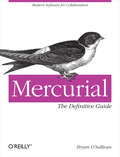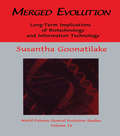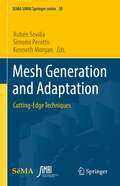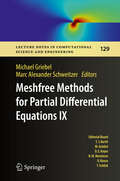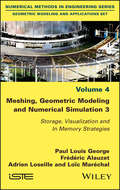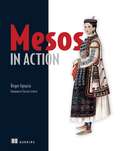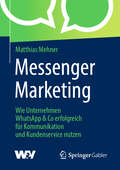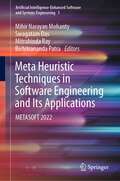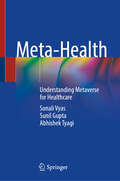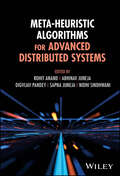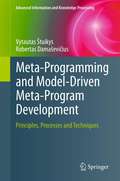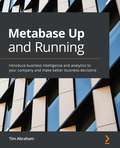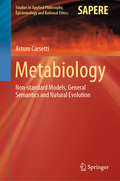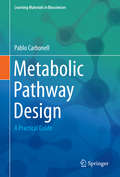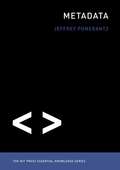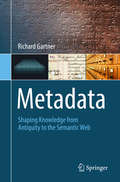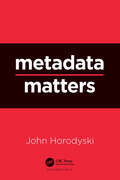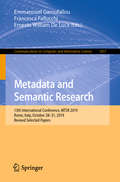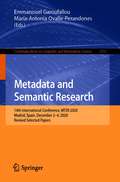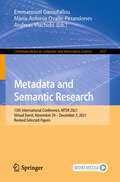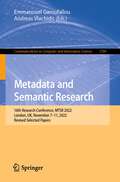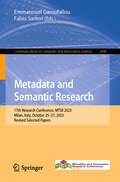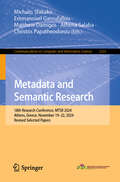- Table View
- List View
Merchants of Truth: The Business of News and the Fight for Facts
by Jill AbramsonFormer executive editor of The New York Times and one of our most eminent journalists Jill Abramson provides a &“valuable and insightful&” (The Boston Globe) report on the disruption of the news media over the last decade, as shown via two legacy (The New York Times and The Washington Post) and two upstart (BuzzFeed and VICE) companies as they plow through a revolution that pits old vs. new media.&“A marvelous book&” (The New York Times Book Review), Merchants of Truth is the groundbreaking and gripping story of the precarious state of the news business. The new digital reality nearly kills two venerable newspapers with an aging readership while creating two media behemoths with a ballooning and fickle audience of millennials. &“Abramson provides this deeply reported insider account of an industry fighting for survival. With a keen eye for detail and a willingness to interrogate her own profession, Abramson takes readers into the newsrooms and boardrooms of the legacy newspapers and the digital upstarts that seek to challenge their dominance&” (Vanity Fair). We get to know the defenders of the legacy presses as well as the outsized characters who are creating the new speed-driven media competitors. The players include Jeff Bezos and Marty Baron (The Washington Post), Arthur Sulzberger and Dean Baquet (The New York Times), Jonah Peretti (BuzzFeed), and Shane Smith (VICE) as well as their reporters and anxious readers. Merchants of Truth raises crucial questions that concern the well-being of our society. We are facing a crisis in trust that threatens the free press. &“One of the best takes yet on journalism&’s changing fortunes&” (Publishers Weekly, starred review), Abramson&’s book points us to the future.
Mercurial: The Definitive Guide (Animal Guide)
by Bryan O'SullivanThis instructive book takes you step by step through ways to track, merge, and manage both open source and commercial software projects with Mercurial, using Windows, Mac OS X, Linux, Solaris, and other systems. Mercurial is the easiest system to learn when it comes to distributed revision control. And it's a very flexible tool that's ideal whether you're a lone programmer working on a small project, or part of a huge team dealing with thousands of files.Mercurial permits a countless variety of development and collaboration methods, and this book offers several concrete suggestions to get you started. This guide will help you:Learn the basics of working with a repository, changesets, and revisionsMerge changes from separate repositoriesSet up Mercurial to work with files on a daily basis, including which ones to trackGet examples and tools for setting up various workflow modelsManage a project that's making progress on multiple fronts at onceFind and fix mistakes by isolating problem sourcesUse hooks to perform actions automatically in response to repository eventsCustomize the output of MercurialMercurial: The Definitive Guide maintains a strong focus on simplicity to help you learn Mercurial quickly and thoroughly.
Merged Evolution: Long-term Complications of Biotechnology and Informatin Technology (World Futures General Evolution Studies #Vol. 14)
by Susantha GoonatilakeMerged Evolution charts the implications of two major forces of change, information technology and biotechnology, combined with a third force, that of 'artifactual' information, which is handed down dichronically from computing device to computing device.Through developments anticipated in the near future, Dr. Goonatilake describes the merging of these three systems, a convergence which will profoundly affect the biological, social, and technical fields much more than previous studies have implied. Together these changes yield an entirely different history - and a different future of the world for life, nature and civilization. This book addresses the broader issue arising from these important developments using the unifying perspective of general evolutionary theory to yield a fresh and profound insight.
Mesh Generation and Adaptation: Cutting-Edge Techniques (SEMA SIMAI Springer Series #30)
by Kenneth Morgan Simona Perotto Rubén SevillaThe developments in mesh generation are usually driven by the needs of new applications and/or novel algorithms. The last decade has seen a renewed interest in mesh generation and adaptation by the computational engineering community, due to the challenges introduced by complex industrial problems.Another common challenge is the need to handle complex geometries. Nowadays, it is becoming obvious that geometry should be persistent throughout the whole simulation process. Several methodologies that can carry the geometric information throughout the simulation stage are available, but due to the novelty of these methods, the generation of suitable meshes for these techniques is still the main obstacle for the industrial uptake of this technology.This book will cover different aspects of mesh generation and adaptation, with particular emphasis on cutting-edge mesh generation techniques for advanced discretisation methods and complex geometries.
Meshfree Methods for Partial Differential Equations IX (Lecture Notes in Computational Science and Engineering #129)
by Michael Griebel Marc Alexander SchweitzerThis volume collects selected papers presented at the Ninth International Workshop on Meshfree Methods held in Bonn, Germany in September 2017. They address various aspects of this very active research field and cover topics from applied mathematics, physics and engineering.The numerical treatment of partial differential equations with meshfree discretization techniques has been a very active research area in recent years. While the fundamental theory of meshfree methods has been developed and considerable advances of the various methods have been made, many challenges in the mathematical analysis and practical implementation of meshfree methods remain.This symposium aims to promote collaboration among engineers, mathematicians, and computer scientists and industrial researchers to address the development, mathematical analysis, and application of meshfree and particle methods especially to multiscale phenomena. It continues the 2-year-cycled Workshops on Meshfree Methods for Partial Differential Equations.
Meshing, Geometric Modeling and Numerical Simulation 3: Storage, Visualization and In Memory Strategies
by Paul Louis George Adrien Loseille Frédéric Alauzet Loïc MaréchalTriangulations, and more precisely meshes, are at the heart of many problems relating to a wide variety of scientific disciplines, and in particular numerical simulations of all kinds of physical phenomena. In Volume 1, the theoretical foundations relating to triangulations, finite element shape functions and their interpretations as geometric patches were explored. This has made it possible to build tools that make the geometric modeling of any object possible. These elements are used in Volume 2 to treat meshing problems in their different implementations. Meshing, Geometric Modeling and Numerical Simulation 3 offers technical additions to the methods seen in the first two volumes and a significant portion of this book is dedicated to mesh visualization problems and solutions, especially those with a high degree of complexity.
Mesos in Action
by Roger IgnazioSummaryMesos in Action introduces readers to the Apache Mesos cluster manager and the concept of application-centric infrastructure. Filled with helpful figures and hands-on instructions, this book guides you from your first steps creating a highly-available Mesos cluster through deploying applications in production and writing native Mesos frameworks.Purchase of the print book includes a free eBook in PDF, Kindle, and ePub formats from Manning Publications.About the TechnologyModern datacenters are complex environments, and when you throw Docker and other container-based systems into the mix, there’s a great need to simplify. Mesos is an open source cluster management platform that transforms the whole datacenter into a single pool of compute, memory, and storage resources that you can allocate, automate, and scale as if you’re working with a single supercomputer.About the BookMesos in Action introduces readers to the Apache Mesos cluster manager and the concept of application-centric infrastructure. Filled with helpful figures and hands-on instructions, this book guides you from your first steps creating a highly-available Mesos cluster through deploying applications in production and writing native Mesos frameworks. You’ll learn how to scale to thousands of nodes, while providing resource isolation between processes using Linux and Docker containers. You’ll also learn practical techniques for deploying applications using popular key frameworks.What’s InsideSpinning up your first Mesos clusterScheduling, resource administration, and loggingDeploying containerized applications with Marathon, Chronos, and AuroraWriting Mesos frameworks using PythonAbout the ReaderReaders need to be familiar with the core ideas of datacenter administration and need a basic knowledge of Python or a similar programming language.About the AuthorRoger Ignazio is an experienced systems engineer with a focus on distributed, fault-tolerant, and scalable infrastructure. He is currently a technical lead at Mesosphere. Table of ContentsPART 1 HELLO, MESOSIntroducing MesosManaging datacenter resources with MesosPART 2 CORE MESOSSetting up MesosMesos fundamentalsLogging and debuggingMesos in productionPART 3 RUNNING ON MESOSDeploying applications with MarathoNManaging scheduled tasks with ChronosDeploying applications and managing scheduled tasks with AuroraDeveloping a framework
Message Not Found
by Dante MedemaAn emotionally complex portrayal of secrets, loss, and grief from Dante Medema, Indies Introduce author of the Indie Next Pick title The Truth Project. Bailey and Vanessa shared everything: laughter, secrets, and packets of Pop Rocks to ward off bad days. But that all changed the night Vanessa left Bailey’s, headed for home, and ended up swerving off a cliff nowhere near her house. Now Bailey, who thought she knew Vanessa better than anyone in the world, is left with a million unanswered questions, and the only person with answers is gone.To help grieve her loss, Bailey creates a chat bot of Vanessa using years’ worth of their shared text messages and emails. The more data she uploads to the bot, the more it feels like she’s really talking to her best friend. That is, until the bot starts dropping hints that there was more going on with Vanessa than Bailey realized—a secret so big, it may have contributed to Vanessa’s death.This compelling puzzle of a story, filled with engrossing twists and turns, is written in alternating prose and text message formats. Teens will gobble up this fast-paced page-turner.
Messenger Marketing: Wie Unternehmen WhatsApp & Co erfolgreich für Kommunikation und Kundenservice nutzen
by Matthias MehnerDieser Leitfaden zeigt Ihnen, wie Sie Messenger-Dienste für Kommunikationsziele im Unternehmen erfolgreich einsetzen können. Sie erhalten gebündelt praxiserprobtes Wissen zu den Einsatzmöglichkeiten der verschiedenen Messenger. Erfahren Sie alles über den Weg zur richtigen Strategie, die relevanten Kennzahlen, ROI-Optimierung, die DSGVO-konforme Umsetzung und vieles mehr – anschaulich dargestellt anhand von realen Beispielen aus verschiedensten Branchen. Rund 90 Prozent der Internetnutzer in Deutschland verwenden Messenger, 81 Prozent davon nutzen WhatsApp. Die Anzahl der Nutzer von Messenger Apps wie WhatsApp, Facebook Messenger, Apple Business Chat & Co wächst seit Jahren kontinuierlich. Sie überflügelt global längst die Nutzung von Social-Media-Kanälen wie Facebook, Twitter oder Snapchat. Auch traditionelle Kommunikationskanäle wie E-Mai oder Telefon verlieren im Hinblick auf Messenger immer mehr an Bedeutung. In diesem Buch erhalten Unternehmen, Vereine und Organisationen Ideen für die Anwendung, Einblicke in Best Cases, konkrete Kennzahlen für die Erfolgsmessung sowie Tool-Tipps und Checklisten für die Umsetzung.Mit Gastbeiträgen von Stephan Schreyer und Rechtsanwalt Dr. Carsten Ulbricht.
Meta Heuristic Techniques in Software Engineering and Its Applications: METASOFT 2022 (Artificial Intelligence-Enhanced Software and Systems Engineering #1)
by Swagatam Das Mihir Narayan Mohanty Mitrabinda Ray Bichitrananda PatraThis book discusses an integration of machine learning with metaheuristic techniques that provide more robust and efficient ways to address traditional optimization problems. Modern metaheuristic techniques, along with their main characteristics and recent applications in artificial intelligence, software engineering, data mining, planning and scheduling, logistics and supply chains, are discussed in this book and help global leaders in fast decision making by providing quality solutions to important problems in business, engineering, economics and science. Novel ways are also discovered to attack unsolved problems in software testing and machine learning. The discussion on foundations of optimization and algorithms leads beginners to apply current approaches to optimization problems. The discussed metaheuristic algorithms include genetic algorithms, simulated annealing, ant algorithms, bee algorithms and particle swarm optimization. New developments on metaheuristics attract researchers and practitioners to apply hybrid metaheuristics in real scenarios.
Meta-Health: Understanding Metaverse for Healthcare
by Sunil Gupta Sonali Vyas Abhishek TyagiMetaverse is an emerging trend these days. It reflects in every field, like education, entertainment, business, and even healthcare. As we can experience, the Healthcare industry is constantly transforming due to emerge of new trends and technologies like moving from X-Rays to digital reports and from telehealth to Virtual Reality. It is a vast digital shift from regular practices to innovative techniques for efficient healthcare services. Metaverse plays a significant role in changing healthcare because it connects innovative technologies like Artificial Intelligence, Virtual Reality, Augmented Reality, IoT, Web 3.0, Quantum Computing, Robotics, etc. This book discusses the application area of utilizing Metaverse in Healthcare services. It focuses on various research trends and technologies related to implementing a metaverse in healthcare systems. It also covers challenges, emerging trends and techniques, and future directions for meta-healthcare systems.
Meta-Heuristic Algorithms for Advanced Distributed Systems
by Abhinav Juneja Sapna Juneja Nidhi Sindhwani Rohit Anand Digvijay PandeyMETA-HEURISTIC ALGORITHMS FOR ADVANCED DISTRIBUTED SYSTEMS Discover a collection of meta-heuristic algorithms for distributed systems in different application domains Meta-heuristic techniques are increasingly gaining favor as tools for optimizing distributed systems—generally, to enhance the utility and precision of database searches. Carefully applied, they can increase system effectiveness, streamline operations, and reduce cost. Since many of these techniques are derived from nature, they offer considerable scope for research and development, with the result that this field is growing rapidly. Meta-Heuristic Algorithms for Advanced Distributed Systems offers an overview of these techniques and their applications in various distributed systems. With strategies based on both global and local searching, it covers a wide range of key topics related to meta-heuristic algorithms. Those interested in the latest developments in distributed systems will find this book indispensable. Meta-Heuristic Algorithms for Advanced Distributed Systems readers will also find: Analysis of security issues, distributed system design, stochastic optimization techniques, and more Detailed discussion of meta-heuristic techniques such as the genetic algorithm, particle swam optimization, and many others Applications of optimized distribution systems in healthcare and other key??industries Meta-Heuristic Algorithms for Advanced Distributed Systems is ideal for academics and researchers studying distributed systems, their design, and their applications.
Meta-Programming and Model-Driven Meta-Program Development
by Vytautas Štuikys Robertas DamaševičiusMeta-Programming and Model-Driven Meta-Program Development: Principles, Processes and Techniques presents an overall analysis of meta-programming, focusing on insights of meta-programming techniques, heterogeneous meta-program development processes in the context of model-driven, feature-based and transformative approaches. The fundamental concepts of meta-programming are still not thoroughly understood, in this well organized book divided into three parts the authors help to address this. Chapters include: Taxonomy of fundamental concepts of meta-programming; Concept of structural heterogeneous meta-programming based on the original meta-language; Model-driven concept and feature-based modeling to the development process of meta-programs; Equivalent meta-program transformations and metrics to evaluate complexity of feature-based models and meta-programs; Variety of academic research case studies within different application domains to experimentally verify the soundness of the investigated approaches. Both authors are professors at Kaunas University of Technology with 15 years research and teaching experience in the field. Meta-Programming and Model-Driven Meta-Program Development: Principles, Processes and Techniques is aimed at post-graduates in computer science and software engineering and researchers and program system developers wishing to extend their knowledge in this rapidly evolving sector of science and technology.
Metabase Up and Running: Introduce Business Intelligence And Analytics To Your Company And Make Better Business Decisions
by Tim AbrahamThis book is for business analysts, data analysts, data scientists, and other professionals who want to become well-versed with business intelligence and analytics using Metabase. This book will also appeal to anyone who wants to understand their data and extract meaningful insights from scratch using practical examples. A basic understanding of data handling and processing will be beneficial before you get started with this book.
Metabiology: Non-standard Models, General Semantics and Natural Evolution (Studies in Applied Philosophy, Epistemology and Rational Ethics #50)
by Arturo CarsettiIn the context of life sciences, we are constantly confronted with information that possesses precise semantic values and appears essentially immersed in a specific evolutionary trend. In such a framework, Nature appears, in Monod’s words, as a tinkerer characterized by the presence of precise principles of self-organization. However, while Monod was obliged to incorporate his brilliant intuitions into the framework of first-order cybernetics and a theory of information with an exclusively syntactic character such as that defined by Shannon, research advances in recent decades have led not only to the definition of a second-order cybernetics but also to an exploration of the boundaries of semantic information. As H. Atlan states, on a biological level "the function self-organizes together with its meaning". Hence the need to refer to a conceptual theory of complexity and to a theory of self-organization characterized in an intentional sense. There is also a need to introduce, at the genetic level, a distinction between coder and ruler as well as the opportunity to define a real software space for natural evolution. The recourse to non-standard model theory, the opening to a new general semantics, and the innovative definition of the relationship between coder and ruler can be considered, today, among the most powerful theoretical tools at our disposal in order to correctly define the contours of that new conceptual revolution increasingly referred to as metabiology. This book focuses on identifying and investigating the role played by these particular theoretical tools in the development of this new scientific paradigm. Nature "speaks" by means of mathematical forms: we can observe these forms, but they are, at the same time, inside us as they populate our organs of cognition. In this context, the volume highlights how metabiology appears primarily to refer to the growth itself of our instruments of participatory knowledge of the world.
Metabolic Pathway Design: A Practical Guide (Learning Materials in Biosciences)
by Pablo CarbonellThis textbook presents solid tools for in silico engineering biology, offering students a step-by-step guide to mastering the smart design of metabolic pathways. The first part explains the Design-Build-Test-Learn-cycle engineering approach to biology, discussing the basic tools to model biological and chemistry-based systems. Using these basic tools, the second part focuses on various computational protocols for metabolic pathway design, from enzyme selection to pathway discovery and enumeration. In the context of industrial biotechnology, the final part helps readers understand the challenges of scaling up and optimisation. By working with the free programming language Scientific Python, this book provides easily accessible tools for studying and learning the principles of modern in silico metabolic pathway design. Intended for advanced undergraduates and master’s students in biotechnology, biomedical engineering, bioinformatics and systems biology students, the introductory sections make it also useful for beginners wanting to learn the basics of scientific coding and find real-world, hands-on examples.
Metadata
by Jeffrey PomerantzWhen "metadata" became breaking news, appearing in stories about surveillance by the National Security Agency, many members of the public encountered this once-obscure term from information science for the first time. Should people be reassured that the NSA was "only" collecting metadata about phone calls -- information about the caller, the recipient, the time, the duration, the location -- and not recordings of the conversations themselves? Or does phone call metadata reveal more than it seems? In this book, Jeffrey Pomerantz offers an accessible and concise introduction to metadata. In the era of ubiquitous computing, metadata has become infrastructural, like the electrical grid or the highway system. We interact with it or generate it every day. It is not, Pomerantz tell us, just "data about data." It is a means by which the complexity of an object is represented in a simpler form. For example, the title, the author, and the cover art are metadata about a book. When metadata does its job well, it fades into the background; everyone (except perhaps the NSA) takes it for granted.Pomerantz explains what metadata is, and why it exists. He distinguishes among different types of metadata -- descriptive, administrative, structural, preservation, and use -- and examines different users and uses of each type. He discusses the technologies that make modern metadata possible, and he speculates about metadata's future. By the end of the book, readers will see metadata everywhere. Because, Pomerantz warns us, it's metadata's world, and we are just living in it.
Metadata
by Richard GartnerThis book offers a comprehensive guide to the world of metadata, from its origins in the ancient cities of the Middle East, to the Semantic Web of today. The author takes us on a journey through the centuries-old history of metadata up to the modern world of crowdsourcing and Google, showing how metadata works and what it is made of. The author explores how it has been used ideologically and how it can never be objective. He argues how central it is to human cultures and the way they develop. Metadata: Shaping Knowledge from Antiquity to the Semantic Web is for all readers with an interest in how we humans organize our knowledge and why this is important. It is suitable for those new to the subject as well as those know its basics. It also makes an excellent introduction for students of information science and librarianship.
Metadata Matters
by John Horodyski"In what is certain to be a seminal work on metadata, John Horodyski masterfully affirms the value of metadata while providing practical examples of its role in our personal and professional lives. He does more than tell us that metadata matters—he vividly illustrates why it matters." —Patricia C. Franks, PhD, CA, CRM, IGP, CIGO, FAI, President, NAGARA, Professor Emerita, San José State University, USA If data is the language upon which our modern society will be built, then metadata will be its grammar, the construction of its meaning, the building for its content, and the ability to understand what data can be for us all. We are just starting to bring change into the management of the data that connects our experiences. Metadata Matters explains how metadata is the foundation of digital strategy. If digital assets are to be discovered, they want to be found. The path to good metadata design begins with the realization that digital assets need to be identified, organized, and made available for discovery. This book explains how metadata will help ensure that an organization is building the right system for the right users at the right time. Metadata matters and is the best chance for a return on investment on digital assets and is also a line of defense against lost opportunities. It matters to the digital experience of users. It helps organizations ensure that users can identify, discover, and experience their brands in the ways organizations intend. It is a necessary defense, which this book shows how to build.
Metadata and Semantic Research: 13th International Conference, MTSR 2019, Rome, Italy, October 28–31, 2019, Revised Selected Papers (Communications in Computer and Information Science #1057)
by Emmanouel Garoufallou Francesca Fallucchi Ernesto William De LucaThis book constitutes the thoroughly refereed proceedings of the 13th International Conference on Metadata and Semantic Research, MTSR 2019, held in Rome, Italy, in October 2019. The 27 full and 15 short papers presented were carefully reviewed and selected from 96 submissions. The papers are organized in the following tracks: metadata and semantics for digital libraries, information retrieval, big, linked, social and open data; metadata and semantics for agriculture, food, and environment; digital humanities and digital curation; cultural collections and applications; european and national projects; metadata, identifiers and semantics in decentralized applications, blockchains and P2P systems.
Metadata and Semantic Research: 14th International Conference, MTSR 2020, Madrid, Spain, December 2–4, 2020, Revised Selected Papers (Communications in Computer and Information Science #1355)
by Emmanouel Garoufallou María-Antonia Ovalle-PerandonesThis book constitutes the thoroughly refereed proceedings of the 14th International Conference on Metadata and Semantic Research, MTSR 2020, held in Madrid, Spain, in December 2020. Due to the COVID-19 pandemic the conference was held online. The 24 full and 13 short papers presented were carefully reviewed and selected from 82 submissions. The papers are organized in the following tracks: metadata, linked data, semantics and ontologies; metadata and semantics for digital libraries, information retrieval, big, linked, social and open data; metadata and semantics for agriculture, food, and environment, AgroSEM 2020; metadata and semantics for open repositories, research information systems and data infrastructures; digital humanities and digital curation, DHC 2020; metadata and semantics for cultural collections and applications; european and national projects; knowledge IT artifacts (KITA) in professional communities and aggregations, KITA 2020.
Metadata and Semantic Research: 15th International Conference, MTSR 2021, Virtual Event, November 29 – December 3, 2021, Revised Selected Papers (Communications in Computer and Information Science #1537)
by Emmanouel Garoufallou María-Antonia Ovalle-Perandones Andreas VlachidisThis book constitutes the thoroughly refereed proceedings of the 15th International Conference on Metadata and Semantic Research, MTSR 2021, held as a virtual event in November-December 2021. The 27 full and 7 short papers presented were carefully reviewed and selected from 92 submissions. The papers are organized in the following topical sections: metadata, linked data, semantics and ontologies - general session, and track on agriculture, food and environment; track on open repositories, research information systems and data infrastructures; track on knowledge IT artifacts (KITA) and decentralized applications, blockchains and P2P systems, and general session; track on digital humanities and digital curation, and general session; track on digital libraries, information retrieval, big, linked, social and open data; track on european and national projects, and general session; track on cultural collections and applications, and general session.
Metadata and Semantic Research: 16th Research Conference, MTSR 2022, London, UK, November 7–11, 2022, Revised Selected Papers (Communications in Computer and Information Science #1789)
by Emmanouel Garoufallou Andreas VlachidisThis book constitutes the refereed post proceedings of the 16th Research Conference onMetadata and Semantic Research, MTSR 2022, held in London, UK, during November 7–11, 2022.The 21 full papers and 4 short papers included in this book were carefully reviewed andselected from 79 submissions. They were organized in topical sections as follows: metadata, linked data, semantics and ontologies - general session, and track on Knowledge IT Artifacts (KITA), Track on digital humanities and digital curation, and track on cultural collections and applications, track on digital libraries, information retrieval, big, linked, social & open data, and metadata, linked data, semantics and ontologies - general session, track on agriculture, food & environment, and metadata, linked Data, semantics and ontologies - general, track on open repositories, research information systems & data infrastructures, and metadata, linked data, semantics and ontologies - general, metadata, linked data, semantics and ontologies - general session, and track on european and national projects.
Metadata and Semantic Research: 17th Research Conference, MTSR 2023, Milan, Italy, October 25–27, 2023, Revised Selected Papers (Communications in Computer and Information Science #2048)
by Emmanouel Garoufallou Fabio SartoriThis book constitutes the refereed post proceedings of the 17th Research Conference on Metadata and Semantic Research, MTSR 2023, held in Milan, Italy, during October 25–27, 2023. The 27 papers included in this book were carefully reviewed and selected from 75 submissions. These papers are compiled from the following eight tracks of the conference: Digital Libraries, Information Retrieval, Big, Linked, Social, and Open Data; Agriculture, Food, and Environment; Open Repositories, Research Information Systems, and Data Infrastructures; Digital Humanities and Digital Curation; Cultural Collections and Applications; European and National Projects; Knowledge IT Artifacts in Professional Communities and Aggregations; and Metadata, Identifiers, and Semantics in Decentralized Applications, Blockchains, and P2P Systems.
Metadata and Semantic Research: 18th Research Conference, MTSR 2024, Athens, Greece, November 19–22, 2024, Revised Selected Papers (Communications in Computer and Information Science #2331)
by Emmanouel Garoufallou Christos Papatheodorou Athena Salaba Michalis Sfakakis Matthew DamigosThis book constitutes the refereed post proceedings of the 18th Research Conference on Metadata and Semantic Research, MTSR 2024, held in Athens, Greece, during November 19–22, 2024. The 23 full papers and 6 short papers included in this book were carefully reviewed and selected from 59 submissions. These papers were organized in the following sections: track on metadata, linked data, semantics and ontologies - general session; track on open repositories, research information systems & data infrastructures; track on digital libraries, information retrieval, big, linked, social & open data; track on cultural collections & application; track on european and national projects; and 8th dOAbLE - papers for libraries, archives,museums; track on agriculture, food & environment (agroSEM'24); track on digital humanities and digital curation.

